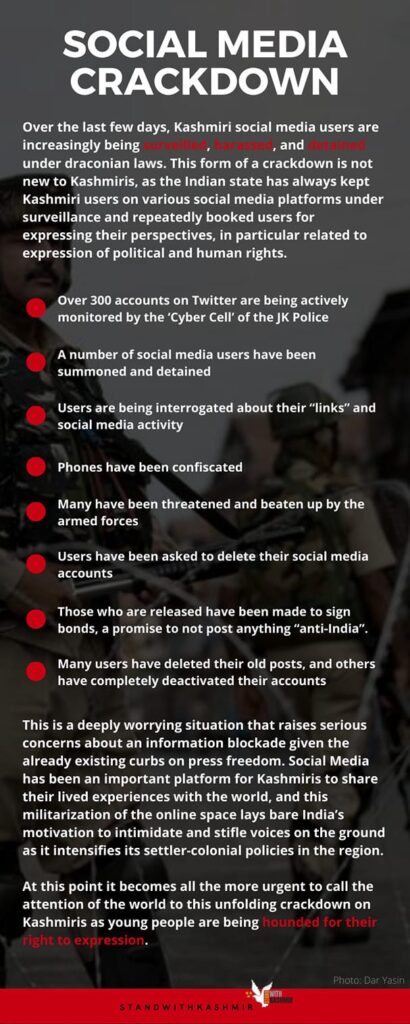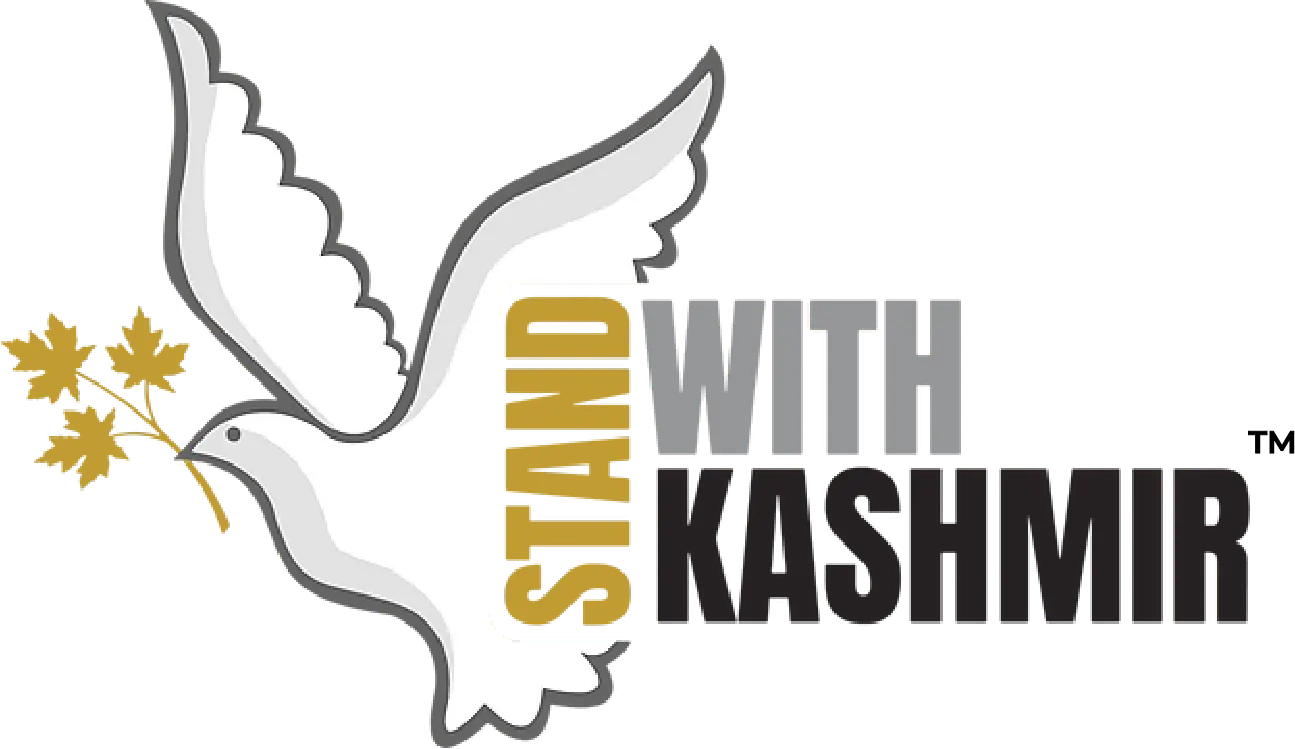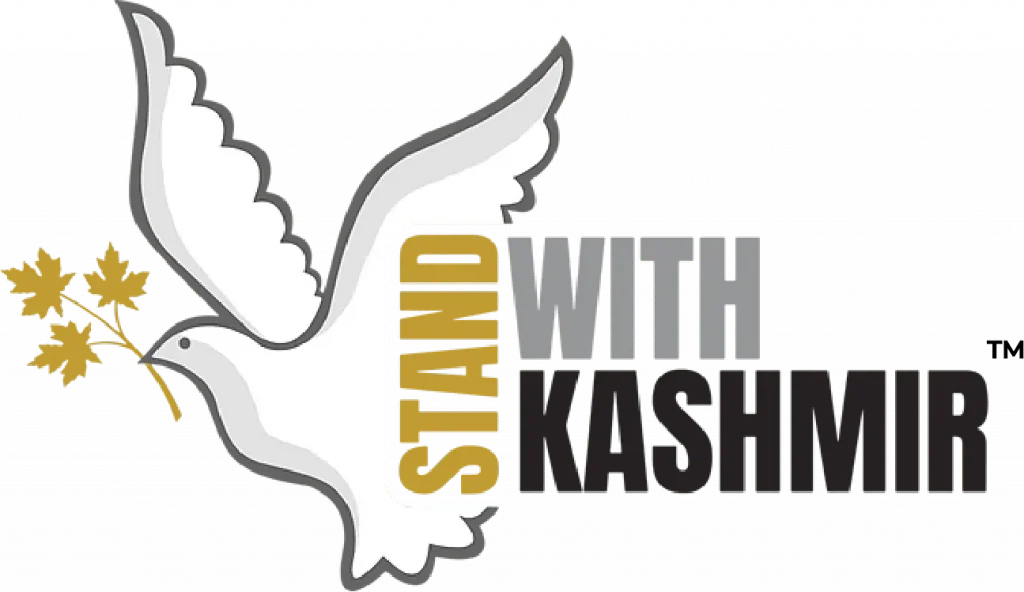Young Kashmiris on What it Means to be Silenced on Social Media
Srinagar, Indian-Occupied Kashmir. August 21, 2020.

Credit: Indian Express
Ahmad, a resident of Srinagar, who did not want to be identified with his first name, fears to talk about the situation in Kashmir on social media. Instead, he says he discusses tomatoes, eggplants, and the weather on Twitter as the police have started to crackdown on social media users found criticizing the Indian government’s oppressive policies in the occupied territory.
The Indian government has already placed a ban on expressing opposition to the government’s controversial moves such as the abrogation of Article 370, mass arrests, silencing of journalists, and plans for demographic change. More recently, for the past two weeks, the cyber police in Kashmir have summoned a number of social media users who were countering government propaganda and highlighting the realities on the ground. Many of their accounts have now disappeared from Twitter and other social media outlets. Police have said that they are investigating 300 Twitter handles in Kashmir.
“We have been receiving complaints of online harassment, cyber bullying, blackmailing, and profanity besides threats by anonymous social media handles. Process of identification of such handles is initiated, legal action will follow,” the cyber police said in a statement.
Ahmad says that many Kashmiris, including his friends, have been missing from Twitter since last week, as they had either deactivated their accounts or some were not tweeting at all. Some accounts on Twitter have also announced that they do not take responsibility of their past tweets, while others are deleting previous tweets. Soon, Ahmad says, he heard that the Jammu and Kashmir cyber police summoned many of them. He says slowly everyone in Kashmir is being forced into silence even in the virtual space, as there has already been a strict military and communication lockdown for months after last August.
“I personally know six people who were summoned by the police. They have been let go after signing a bond that they will not write anything and if they do, they will booked under serious charges like Unlawful Activities Prevention Act (UAPA),” he states, adding that it has created a fear-psychosis among most of the Twitter users in Kashmir which includes students, professionals, activists, lawyers, and traders, who were actively speaking out against Indian government policies.
“I am thinking of posting photos of tomatoes and mangoes now. There is nothing left to express your opinions on. So, I think tomatoes and mangoes won’t get me a UAPA case.” Ahmad believes that it’s one of the many tactics to silence the people of Kashmir completely.
After August 5 last year, the government deployed additional armed forces in the region and launched a massive crackdown by arresting pro-freedom leaders, activists and young people as it apprehended a mass uprising. In the recent months, the government has further choked almost all spaces of expression and dissent. It has also caused a pressure among the journalists who are being summoned and questioned. Two of them were booked under UAPA for their social media posts.
“They have done it already offline by arresting all the politicians and activists. Now they want to take this drive online. They started with journalists and now turned their focus on influential tweeters who have the potential to turn around the discussions related to Kashmir,” says Shareen, a social media user who is a graduate student.
It’s mostly the young people who have been trying to mobilize support for a resolution of the Kashmir issue on social media and countering the government propaganda of ‘Naya Kashmir’. The government uses the tag line to portray a “new Kashmir” after the division of the state and removal of its special status. On the first anniversary of Article 370 abrogation many fake accounts appeared on Twitter, claiming to be Kashmiri, and were tweeting under the hashtag. But the Kashmiri Twitter users were quick to notice them.

New, fake accounts were created in time for the year anniversary of Article 370 abrogation. All were using the hashtag #nayakashmir.
A Twitter user aged 24 in southern Kashmir said that he fears to tweet anymore about the situation. He said that he activates his account at night and deletes the tweets that he thinks can put him into trouble.
“I cannot express myself. I have to choke my own voice before words come out to save myself. There is a height of oppression going on,” he states, pointing to the fear of arrests. Even women have been warned and summoned for their posts. Misbah (name changed) said that after she talked about an actual event on social media, the police summoned her.
“They have created a narrative that if anyone dares to talk on Kashmir or highlight the miseries is a crim
e and goes against the constitution of India but they do not understand whatever they are doing is basically against the basic rights. When I was called to a police station for writing something factu
al for the entire day all the agencies were after me. For a moment, I was thinking do they have no other work to do? If this can happen for highlighting an incident I wonder what will happen to those who criticize and have opinions and disagree with their thoughts,” she argues.

On July 18, Indian forces claimed to have killed three rebels in Amshipora, Shopian. However, their families from Rajouri in the Jammu region have come forward accusing the forces of killing their kin, who had travelled to Shopian in search of work, in a fake encounter. Many social media users believe that after the incident was highlighted, the crackdown on social media users became more intense.
“The government wants to paint a good picture of Kashmir which is a complete lie that these social media users have been countering. Recently people raised a hue and cry on a fake encounter in which three civilians were killed and dubbed as militants. The government wants to bury all these ground realities…they are silencing everyone,” Misbah says.
Some of the social media users who work in the public sector have been made to sign bonds by their offices as well and told to ensure “good behavior” on social media.
Read more:
Stay in touch with Stand with Kashmir.
Stand With Kashmir (SWK) is a Kashmiri diaspora-driven independent, transnational, grassroots movement committed to standing in solidarity with the people of Indian occupied Kashmir in ending the Indian occupation of their homeland and supporting the right to self-determination of the pre-partition state of Jammu and Kashmir. We want to hear from you. If you have general inquiries, suggestions, or concerns, please email us at info@standwithkashmir.org.
©2025 StandWithKashmir All rights reserved. SWK is a 501(c)(3) non-for-profit organization.


Leave a Reply